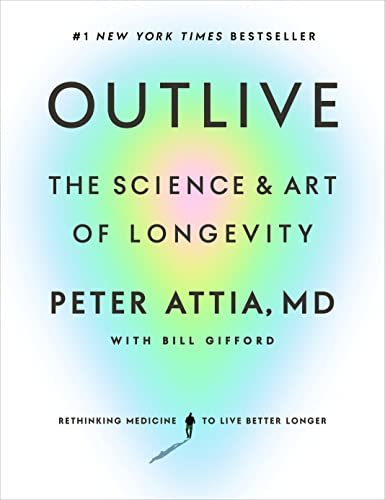Outlive: The Science and Art of Longevity by Peter Attia
Date read: 4/23/23. Recommendation: 9/10.
Incredibly useful and detailed book on longevity. Attia emphasizes the importance of focusing not just on lifespan—how long you live—but healthspan—the quality of your years. He details how Medicine 2.0 has missed the boat and treats medical conditions on the wrong end of the timescale after they’ve already taken hold. In Medicine 3.0, the focus is on prevention, and this demands that you take responsibility for your own health. Attia frames up the tactics in Medicine 3.0—exercise, nutrition, sleep, emotional health, and exogenous molecules—and adds scientific rigor, as well as recommendations so you can begin applying them to your own life.
Check out my notes below or Amazon for details and reviews.
My Notes:
Longevity has two components:
Lifespan: How long you live
Healthspan: The quality of your years
Medicine 3.0:
Nearly all the insurance money flows to treatment rather than prevention: “Medicine’s biggest failing is in attempting to treat all these conditions at the wrong end of the timescale—after they are entrenched—rather than before they take root.” PA
Medicine 3.0 places greater emphasis on prevention rather than treatment, considers the patient a unique individual, focuses on an honest assessment of risk versus reward versus cost, and pays more attention to maintaining healthspan, the quality of life.
“In Medicine 2.0, you are a passenger on the ship, being carried along somewhat passively. Medicine 3.0 demands much more from you, the patient: You must be well informed, medically literate to a reasonable degree, clear-eyed about your goals, and cognizant of the true nature of risk.” PA
“I never won a fight in the ring; I always won in preparation.” Muhammad Ali
Tactics:
“Changing how we exercise, what we eat, and how we sleep (see Part III) can completely turn the tables in our favor. The bad news is that these things require effort to escape the default modern environment that has conspired against our ancient (and formerly helpful) fat-storing genes, by overfeeding, undermining, and undersleeping us all.” PA
“There is some risk involved in action, there always is. But there is far more risk in failure to act.” Harry S. Truman
“Absorb what’s useful, discard what is useless, and add what is specifically your own.” Bruce Lee
Neurodegenerative diseases:
Exercise is the single most powerful item in our neurodegeneration prevention tool kit. Sleep is also a very powerful tool against Alzheimer’s. Studies have shown regular exercisers live as much as a decade longer than sedentary people.
Strategy is based on the following principles:
What’s good for the heart is good for the brain: vascular health is crucial to brain health.
What’s good for the liver (and pancreas) is good for the brain: metabolic health is crucial to brain health.
Time is key: Think about prevention and play the very long game.
Our most powerful tool for preventing cognitive decline is exercise: lots of it.
Exercise:
Peak aerobic cardiorespiratory fitness (V02 Max) is the most powerful marker for longevity.
Emotional health:
“Every man is a bridge, spanning the legacy he inherited and the legacy he passes on.” Terrence Real
“Family pathology rolls from generation to generation like a fire in the woods taking down everything in its path until one person, in one generation, has the courage to turn and face the flames. That person brings peace to his ancestors and spares the children that follow.” Terrence Real
“Who cares how well you perform if you’re so utterly miserable?” PA
“Maybe the journey isn’t so much about becoming anything. Maybe it’s about unbecoming everything that isn’t really you, so you can be who you were meant to be in the first place.” Paulo Coelho

